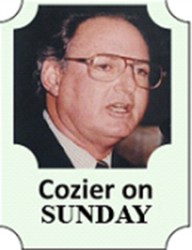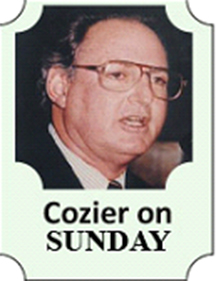By Tony Cozier
Chief selector Clive Lloyd offered two reasons last Sunday for Shivnarine Chanderpaul’s omission from the West Indies squad for the two forthcoming Tests against Australia, effectively ending the longest career of any West Indian.
One was the abrupt decline in the indomitable left-hander’s trademark reliability over his past two series, against South Africa and England, in which he averaged 16 in 11 innings; the corollary was that “the time had come to look to younger players.”
In the face of widespread opinion that Chanderpaul be given the two Tests as a satisfactory send-off to his outstanding career – as was the case when India hosted the West Indies for their national icon Sachin Tendulkar’s home farewell in December, 2013 – head coach Phil Simmons asserted that the panel had been charged with selecting a team to win a series against Australia; going through the process, Chanderpaul didn’t “fit in”.
 Michael Holding was one former West Indies players who agreed. “I don’t believe that cricketers should just get a series for getting a series sake. I don’t think Shivnarine Chanderpaul has proven in recent times that he is still a good enough player to be playing for the West Indies,” he told ESPNcricinfo.
Michael Holding was one former West Indies players who agreed. “I don’t believe that cricketers should just get a series for getting a series sake. I don’t think Shivnarine Chanderpaul has proven in recent times that he is still a good enough player to be playing for the West Indies,” he told ESPNcricinfo.
Such explanations didn’t concern those who interpreted his exclusion as disrespect for Chanderpaul’s longevity, commitment and record.
Brian Lara, his teammate during his first 13 years as the rock constantly supporting a brittle middle order, echoed the general consensus. Chanderpaul, he maintained, had “earned the right to say goodbye in an acceptable way and should be allowed to do it in his own way.”
Wavell Hinds, another member of the team during the difficult times, said the West Indies Players’ Association (WIPA), which he now heads, “was disappointed in the manner in which Mr.Chanderpaul was treated.” He described the process as “untidy and distasteful.”
Chanderpaul’s home administration, the Guyana Cricket Board (GCB), was more forthright. It declared that it just “cannot believe nor even fathom the thought process behind the wanton dropping of the most senior, reliable and dependable batsman of the West Indies for the past 21 years.”
A host of internet bloggers used even stronger, more colourful language.
In the hullabaloo, the point was overlooked that, for all his declining scores, Chanderpaul’s experience of 164 Tests would be missing in a team palpably short of it against Test opponents ranked second only to South Africa.
Of the squad of 12 initially named for Wednesday’s opening Test, captain Denesh Ramdin (67) and Marlon Samuels (58) are the only ones with more than 50 Tests on their cvs; nine are aged under 30, three under 24.
Lloyd was unfazed. As far as he was concerned, it was not a burden on the coming generation, rather a challenge.
“Our aim as selectors is to continue to play our young players, to give them exposure and you can’t get better exposure than playing against one of the best teams in the world,” he said. “They will be tested and that is what it’s all about.”
It is a faith in youth that can be traced back to 1974 and Lloyd’s elevation to the captaincy for the tour of India, Sri Lanka and Pakistan over Rohan Kanhai, a batsman every bit as special as Chanderpaul is now.
Kanhai was 38 and had come off a disappointing home series against England in which his highest score in seven innings was 44, his average 26.16.
Installing Lloyd, the West Indies board stated it had “arrived at the conclusion that…the time had come for younger players to lead the West Indies team”. Lloyd used the same terminology in this case. The first-timers then were tested by the famed Indian quartet of spinners, Erapalli Prasanna, Bishen Bedi, Bhagwat Chandrasekhar and Srinivasan Venkataraghavan, and the swing of Pakistan’s Sarfraz Nawaz and Asif Masood in alien conditions.
Gordon Greenidge’s 93 and 107 in his debut Test in Bangalore and Vivian Richards’ unbeaten 192 in Delhi in his second were precursors of the long and exceptional careers to follow. Andy Roberts, on his first tour after a solitary previous Test in Barbados, set a new record with 44 wickets in the seven Tests.
Inevitably, not all the newcomers flourished. At least, their temperaments in alien environments are tested as it will be in the current situation.
Throughout his 20 years at the helm, Lloyd stuck to his youth policy. Michael Holding, Colin Croft and Joel Garner, all in their early 20s, and Wayne Daniel, 19, were introduced with little to recommend them except obvious talent and youth to form the feared all-pace attack in support of the established Roberts.
Even when his teams were so strong they were a virtual closed shop, Lloyd prompted the selectors of the day to favour youngsters.
Almost 30 years after he announced his retirement following the 1984-85 tour of Australia, aged 40 after 110 Tests, Lloyd returned to West Indies cricket last year as chairman of selectors after stints as team manager and ICC match referee.
He immediately pulled a rabbit from the hat, choosing Jason Holder as ODI captain, at 23 the youngest of all West Indies’ skippers. In six months, he has already matched Lloyd’s expectations. His all-round success in the series against England and that of Jermaine Blackwood, 23, and Kraigg Brathwaite, 24, in their brief time as Test batsmen, was early support for Lloyd’s youth-first belief. The confident performance by the next-in-line recruits of the President’s XI in the three-day opener against the Australians last week was a further boost.
Lloyd was on hand 21 years ago to observe the surprise inclusion of a skinny 19-year-old left-hander in the 1994 Test against England at Bourda. His name was Shivnarine Chanderpaul.
Over the next 21 years, through hard work, dedication and discipline, he confirmed the benefits of early exposure to the most challenging level of the game.
Typically, Lloyd reckoned, in light of his declining returns and his age that the time had come for him to make way for some younger man. Just as typically, Chanderpaul, with the tenacity that has always marked his cricket, refused the offer to retire before he was dropped.
The enormous hole left by his exit surely won’t be adequately filled by the aspiring contenders in the short term, probably not even the long term. Lloyd’s theory is that they should be given the chance.










